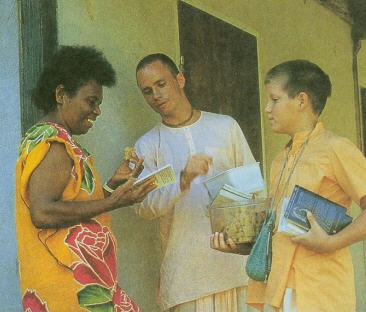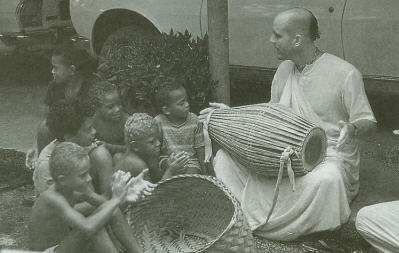Where is it?
And what about the horrible stories?
THE LETTER ARRIVED by air mail registered express from New Caledonia. Sitting in the office at our center in Sydney, Australia, I mused over the colorful stamps depicting a beautiful tropical isle.
"Where in the world is New Caledonia?" I asked Priyavrata, who looked over my shoulder curiously.
"I'm not exactly sure," he said. "I think it might be part of the Falkland Islands somewhere near Argentina."
"It's in the South Pacific!" said Ajita, who had just come in the door. "You never studied geography? It's a French territory."

Nila Madhava Dasa
Opening the envelope, I wondered who could be writing me from the South Seas. I discovered it was my old friend Mahabhagavata Dasa from France. He'd gone to New Caledonia three years ago with his wife and child to open a Hare Krsna temple. Somewhat isolated from devotees, he was inviting me to come there for a month or two to spread Krsna consciousness.
"There are many opportunities for reaching the French here," Mahabhagavata wrote, "and the weather is ideal."
"Notice how he mentioned the French," said Ajita, "and not the Melanesians. They're the island folk who've lived there for thousands of years. Some of them wanted independence a few years ago. When it came to a vote, the majority preferred to stay a French territory. But there's still a lot of tension between the French and the local people."
"What do you think, Prabhus?" I asked, "Why don't we go for a few weeks?"
They answered with big grins.
One week later six of us flew out of Sydney loaded with books, drums, and cymbals, bound for Noumea, New Caledonia, two thousand kilometers northeast of Sydney in the South Pacific Ocean.
That evening, as our Boeing 727 circled over New Caledonia getting ready to land, the red-orange sunset spread a magnificent backdrop behind the vast horizon. The green island stood out like an emerald against the turquoise water. As we landed and the doors opened, a warm tropical breeze greeted us.
"I think I'm going to like it here," joked Priyavrata.
After customs and immigration, Mahabhagavata Dasa, with his wife, Govinda Mohini Dasi, and their fourteen-year-old son, Laksmi Narayana Dasa, greeted us enthusiastically outside.
"Thank you for coming, Prabhus," said Mahabhagavata as he placed a fragrant flower garland around the neck of each devotee.
In the bus back to the temple, Mahabhagavata explained their situation on the island.
"We've been here three years," he said. "We have a simple center with a vegetarian restaurant. It's just on the outskirts of the city. We serve around seventy-five people a day.
"Europeans?" I asked.
"Mostly," he said. "But once in a while the islanders come too. You know there's some tension here?"
"Yes, I've heard," I replied.
"We distribute many books door to door in the European section," Mahabhagavata said.
I looked up. "And to the Melanesians?"
"In the capital, Noumea, there's no problem. But it's too dangerous to go to their villages outside the city," he said. "No outsiders go there."
Our bus stopped abruptly in front of the Hare Krsna restaurant.
As we sat and took prasadam, everyone hungry after the long journey, I noticed Mahabhagavata speaking quietly to his wife near the kitchen. He seemed to have guessed my mind. She shook her head disapprovingly and walked over to our table.
"Maharaja, excuse me," she said. "But no one goes to those villages. We've heard horrible stories."
"But we're not going there to take anything," Ajita said. "They ought to see we've come to give them something Krsna consciousness."
"But how will they know it has anything to do with God?" she asked.
"Know or not know," I said, "Krsna's holy name will make the atmosphere auspicious. And prasadam will break the ice!"
By this time Mahabhagavata was becoming convinced. He said we should make a plan.
"The plan is simple," I said. "Like anywhere else in the world, we'll chant Hare Krsna and pass out books and prasadam. And if there's any problem, we'll depend on Krsna."
That afternoon and evening everyone got ready for the next day's expedition. An air of excitement filled the temple as devotees loaded the vans with books and instruments and cooked prasadam in the kitchen.
"Make the prasadam first class," I asked. "It's our ultimate weapon."

Chanting From Indradyumna Swami
By late evening everything was packed and ready to go. We went to sleep with great hope.
We awoke well before sunrise, and by 7 A.M. we had finished our spiritual practices. The devotees seemed particularly intent on their chanting. They were taking shelter in Krsna's name. Despite our optimism, we knew of the risks.
By 9 A.M. we were off. Kirtana filled the van as we drove out of the city. The warm halava prasadamfogged the windows as we entered the jungle and wound our way through the mountains.
After two hours we came out of the mountains and into a valley. We could see small villages scattered here and there, smoke curling from the rooftops of the traditional huts some of the Melanesians still live in. Other, more modern houses dotted the roads to the villages.
"Which village shall we try?" asked Mahabhagavata.
"Let's go to that one," I said, pointing to a village in the center of the valley. "If it's successful, we can fan out and go to the others."
Coming off the main asphalt road, we drove onto a dirt road and headed toward the village. After thirty minutes we pulled up near a group of houses with no one in sight.
"Where is everyone?" Priyavrata asked, a touch of concern in his voice.
"Probably in the fields," said Ajita. "Most likely the women and children are home though."
"Let's get out and have kirtana through the village," I said. "And bring the prasadam."
We started chanting. Soon the doors of the houses began opening, and the residents came forward with big smiles to greet us. Suddenly we found ourselves surrounded by curious and inquisitive faces. As we started to give out prasadam, the procession came to a standstill. Soon people were coming back for seconds and thirds.
I winked at Mahabhagavata. "So much for the horrible stories," I said.
Within an hour we'd passed out all the halava. Chanting from house to house, our fears gone, we drew a following of village children. We felt confident this simple process could bring Krsna consciousness to every village on the island of New Caledonia.
Indradyumna Swami joined ISKCON in Detroit in 1971. He accepted sannyasa, the renounced order of life, in 1979. Since then he has spread Krsna consciousness in many parts of the world.
To know more about Indradyumna Swami, visit www.indradyumnaswami.com
